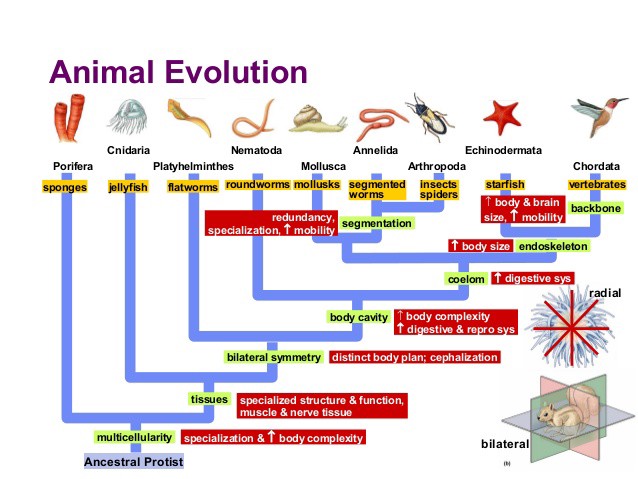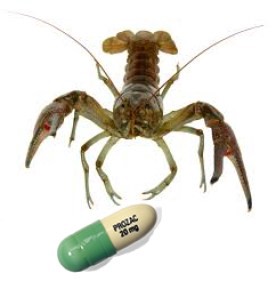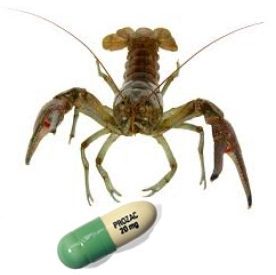Jordan Peterson, professor of psychology at the University of Toronto. Peterson has become a darling of the Youtube alt-right crowd as a result of his refusal to refer to individuals by their preferred gender pronouns, especially new gender-neutral pronouns such as ?Ze? (1). Many people claim that Peterson?s position is ?backed by science? but an examination of some of his claims, especially regarding our evolutionary heritage, shows he is more adept in pseudoscience.

Peterson recently made headlines across the globe when a rather spiky interview with channel four news host Cathy Newman, resulted in her being inundated with threatening and misogynistic messages.
What caught my attention during this exchange was Peterson?s attempt to suggest that human hierarchies are a result of evolution. In particular, Peterson points to the lobster as an example, and in doing so demonstrates the kind of knowledge of evolution we?d normally associate with a creationist.
Peterson attempted to suggest that human hierarchies aren?t socially created, but are effects of human evolution. His evidence for this is the fact that lobsters also have hierarchies(3).
Human lineage diverged from arthropods long before lobsters evolved, so lobster hierarchy clearly developed independently of any human societal structures.
When Jordan says humans ?divulged from lobsters? we can assume that Jordan means ?diverge? rather than ?divulge?. It might seem petty to highlight this, but it is a somewhat embarrassing slip up for a man who insists in the same interview (4)how important words are and how very careful he is in their use! It?s also one that gives the distinct impression Petersen doesn?t have a clue what he is talking about.
Putting this lack of knowledge of terminology aside, the claim Peterson is making is simply not true. Humans did not diverge from lobsters. Jordan throws in the term ?common ancestor? and that element is correct lobsters and humans do share a common ancestor. Peterson tells us that this divergence occurred 350 million years ago, but he is way out here.

The ancestors of lobsters did indeed appear roughly 360 million years ago (5), but lobsters are invertebrates, specifically, arthropods much like arachnids and insects, whilst humans are vertebrates. These are completely separate groups on the phylogenic tree, and diverged at least 500 million years ago (5). As the main difference between two groups of animals is a completely different skeletal structure, it seems sensible to suggest that they diverged before the development of any type of skeletal structure at all. Probably something similar to a roundworm with a centralized nervous system. So human societal structures and lobster hierarchies are completely unrelated as even conservative estimations show the vertebrate branch of the phylogenic tree diverged hundreds of millions of years before the emergence of the proto-lobster.
So what about the other similarities that Peterson highlights? Do they exist at all?
Serotonin is indeed found in the brains of both humans and lobsters. In fact, it is found in the systems of most animals and it is generally linked to aggression. As all species share a common ancestor this shouldn?t be surprising to us. Clearly, serotonin was a part of our and lobster?s common ancestor?s biology. What Peterson doesn?t mention, perhaps because he is unaware, serotonin has a completely different effect in arthropods and vertebrates.
 Rough day at the office dear?
Rough day at the office dear?
In vertebrates lowered levels of serotonin has been shown to lead to increased aggression. Studies using crustaceans, such as crayfish, have shown that increased serotonin can reverse societal positions (6) as these roles are determined by aggressive confrontation. The lobsters with higher serotonin levels engaged in more aggressive confrontations and were less likely to withdraw, thus they improved their societal standing. With invertebrates, the opposite is true (7). In fact, there are conditions in which the failure of a particular gland to produce serotonin in humans causes unprovoked violent outbursts (8).

As for Peterson?s other statement that ?antidepressants work on lobsters? again in the same study as the one linked above Prozac was introduced to lobsters, and a significant effect was found. As in humans, in lobsters, Prozac blocks serotonin uptake into nerve terminals (8). Predictably, as the abundance of serotonin in arthropods has opposite effects to its abundance in the systems of vertebrates, Prozac also has converse effects. So antidepressants do work on lobsters, albeit in a completely different way!
Human hierarchical structures are nothing like those of lobsters. Comparing the two is actually quite laughable. Lobsters are clearly extremely basic animals with a simple brain, much more influenced by body chemistry, and hierarchy is determined by body size and aggression. Clearly, we don?t determine our leaders based on the results of UFC matches.
Aside from talk of mere-biology, our society has clearly moved beyond this reliance to body chemistry to build social hierarchy. The existence of art, music, science, and literature all make Jordan?s comparisons to lobsters utterly facile.
Sources
(1) http://www.independent.co.uk/news/uk/home-news/jordan-peterson-cathy-newman-interview-channel-4-abuse-psychologist-professor-women-political-a8169926.html
(2) https://www.deseretnews.com/article/865629620/10-new-words-added-to-the-dictionary-in-the-past-10-years.html
(3) https://www.youtube.com/watch?v=aMcjxSThD54
(4) https://www.facebook.com/Channel4News/videos/10155601295271939/
(5) https://news.fiu.edu/2014/02/marine-scientists-find-worlds-oldest-lobster/74791
(6) https://www.ncbi.nlm.nih.gov/pmc/articles/PMC20885/
(7) http://www.pnas.org/content/98/3/1277.long
(8) http://www.cam.ac.uk/research/news/serotonin-levels-affect-the-brain%E2%80%99s-response-to-anger
Originally published at skepticsboot.blogspot.com on November 28, 2018.


